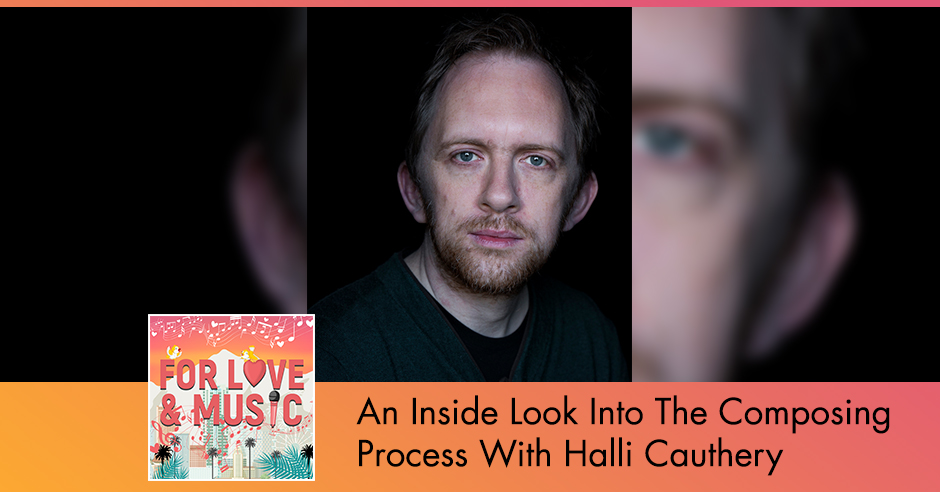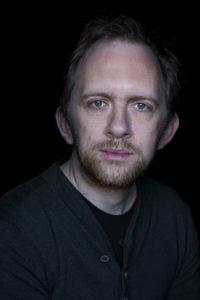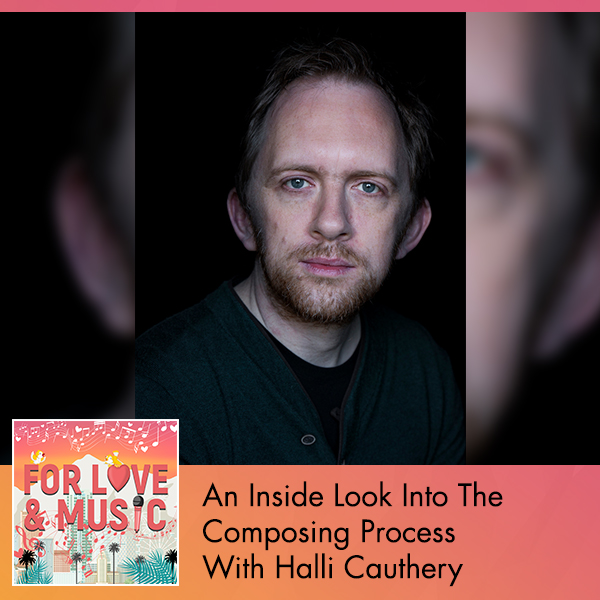
—
Listen to the podcast here:
An Inside Look Into The Composing Process With Halli Cauthery
Interview With Special Guest, Composer Halli Cauthery
Let’s welcome to the show my special guest, Emmy-nominated film and TV composer, Halli Cauthery. Halli, how are you?
I’m okay. How are you doing?
I’m okay. How are you hanging on in there?
Not too bad all to all things considered. My hair is longer than it’s been since about 1995. Apart from that, we’re managing as best we can. We’re still in isolation.
Things have started to open up, but it doesn’t fill you with much confidence to go out?
We feel okay about going for walks around our neighborhood and our block but beyond that, I’m not sure. Things are opening up, but it doesn’t yet feel that it’s particularly safe to be doing so.
Nothing’s changed. I went to a cafe to meet my mother-in-law. By the time I disinfected the cutlery and wiped around the glass and taken my mask on and off a hundred times. It was lovely to see her, but it was a very unrelaxing experience. Maybe I’m overly paranoid. I don’t know.
I’m with you on that. We take the same view here. We’re especially being careful because we had our first child in December.
Congratulations. Is it a boy or a girl?
It’s a boy.
What’s his name?
His name is Conrad.
Can you tell if he’s already musical in any way or not yet?
He does respond to music but I’m not sure. It’s hard to tell so far whether he’s responding because there are sounds. I’m going to be keeping a close eye on him.
The last thing you want is to end up with just a series of unconnected pieces of music. Click To TweetI want to know. He’ll have to be a guest one day on the show. Take us back to the beginning. You’re British as am I. Tell us your journey. You originate from the UK. How did you end up in LA?
I was living in London and this is after finishing my postgraduate studies. I was working as a jobbing musician. My initial study was classical violin. I was playing in orchestras around London and doing all the teaching. I was writing music but not film music. I was writing music at the Concert Hall as I could in my spare time. I got to a point where it wasn’t anything as serious like there’s a crisis, but it was a moment of a career drift. I thought to myself, “I could continue doing this but if I want to write music for a living then I want to try and see if I can get it to film and TV.” I asked myself, “Who do I know that I could speak to?” The obvious name was Harry Gregson-Williams who is a well-known film composer.
You’ve worked a lot with him on X-Men Origins, Cowboys & Aliens, Chronicles of Narnia. The list goes on amazing projects.
The last two Shrek films, a bunch of Tony Scott movies. Harry has been my mentor. The funny thing is that the reason I got in touch with him initially is because I had known him years earlier when I was a tiny kid going afterschool violin lessons at the local music school in South of England where I grew up. It so happened that he was a teacher at that same school. He has a choral background. He was a singing teacher. I got to know him because I used to do the summer camp thing that they always did every year and which I attended 3 or 4 years in a row. He was always one of the staff members there. I knew him from the ages between 9 and 12. I then lost touch with him, but then found out years later that he’d gone into film music. He was the obvious name that sprang to mind when I thought, “Who can I get in touch with to ask for advice?” We reconnected and long story short, he invited me out to LA and I ended up working as his assistant for about 5 or 6 years.
How do you find LA compared to the UK? Do you get back to the UK much?
I tried to. The longest has been my wife being pregnant and the pandemic. This is now the longest time that has gone by without my going back to England. I haven’t been back since Christmas 2018, which doesn’t sound that long ago. Ever since moving here, I’ve gone back every year, at least once. It feels like a long time for me.
I don’t know about you, but whenever I go back to the UK, which I still love, it feels like a comfortable armchair. I don’t find that anything changes much apart from my friend’s kids get older, but everything else stays the same.
I noticed little tiny details even something as thoroughly trivial and insignificant like the fact that a few years ago going back and wandering around in London, getting on the Tube and everyone’s using Oyster cards now. When I left, you still bought tickets. I felt very dinosaur. I’m still buying the tickets rather than having an Oyster card. The tiny details like that always strike me when I go back.
You’ve now become a very successful composer in your own right. Having worked and assisted some amazing famous composers, as you were saying, Harry Gregson-Williams, etc. What’s your process as a composer? How do you go about creating? Have you found that being in isolation has changed the process at all?
Being in isolation hasn’t affected things at all because I finished a project a couple of weeks before we all went on lockdown. I’ve not been working since then. As to the question of how the process works, it slightly depends on the project. There are 1 or 2 principles that I try to stick to. One of which is that when I start, I always try to begin by writing something that is a way for any visuals or any picture. I think that it’s important to have a strong musical idea in place before you start scoring specific scenes. There’s a great temptation to leap straight in and start scoring scenes straight away, particularly because it’s usually working under tight time constraints. You think to yourself, “I’ve only got X number of weeks to do this. Quick, no time to lose. Scene one, go.” The danger of that I find is that you end up scoring moment to moment without an overarching sense of the whole thing. The last thing you want is to end up with a score that consists of a series of unconnected pieces of music. To use as a specific example, this project that I’ve finished, Future Man.
I want to hear all about that. That’s for Hulu, isn’t it? Tell us about Future Man.
Future man is a sci-fi comedy, which is co-created by Seth Rogen and Evan Goldberg. It’s a loving homage to ‘80s sci-fi. It’s chock-full of references to sci-fi tropes of that era. It’s funny, clever, weird in all the best ways. When I was starting out on that, before I’d written anything to picture, before I scored any particular scene, I spent a few days writing the main thing. Only once I’d done that. I go in and picked out a few key scenes, which I thought where we would want to hear that theme. Working that way gave me a framework around which to playing the rest of the score. It meant that there was a strong idea at the center tying everything together. That gives you an idea of how vaguely I try to approach a project like that.
For our audience who may want to get into composing, understand and learn the process, what tips or advice would you give them based on how you’ve gone about the success that you’ve achieved?
That’s a tricky one because everyone that I know in the business has a slightly different story to tell about how they got where they are. Some people started out in a band. Some people had a more classical background like me. Some people will have gone through a film music program at college or university, others didn’t. I went and dive straight in and learned on the job. There isn’t a single right way. One piece of practical advice that I learned quite early on once you’re doing this for a living is to never throw anything away. That’s something that’s been quite valuable to me.

Expand on that a little bit more, not being a hoarder.
You have to be a hoarder in a strange way in the sense that if you write something on a project and the filmmaker or the director, whoever it is, rejects it for any reason, he doesn’t think it’s quite right for the thing that you wrote it for, which happens all the time. That’s part and parcel of that goes with the territory. You should never throw away that thing that you wrote. Always keep it somewhere because invariably you will find a use for it further down the line. It doesn’t even have to be that it was rejected. On Future Man, there’s a good example. I wrote this theme for a particular scene when I was working on the pilot episode. It ended up being too long for the scene when the scene was eventually edited down to its final length. When I tried to edit the music tone to fit the scene, it doesn’t work. You could hear the joins everywhere. Eventually, I have to say, “That’s not working. I’ll have to stop to try something new.” The important thing is to keep what you wrote, because I found two episodes later that theme was perfect for a different scene. It ended up being one of the key themes in the show. That’s something that I’ve always found useful to keep in mind. Always keep things even if it doesn’t work out the first time.
That’s good advice. I want to touch on the fact that you were Emmy-nominated in 2016 for the Netflix DreamWorks animated series Turbo Fast. When you’re creating music for animation, is that a different process? That must be quite fun.
It is fun but it tends to be a little more labor-intensive. That’s a huge generalization.
In what way? For what reason?
In animation, you’re trying to hit more things happening on screen as a general rule. There’s less call for underscoring something and staying out of the way. As an example, one of my favorite episodes of that series that I did and its second season. As that series wore on, they got more and more inventive and experimental. They did a brilliant parody of the old Looney Tunes cartoon. They did a fantastic parody of the Roadrunner and Wile E. Coyote cartoons. I got to write music in that style, which was a joy because I loved that stuff when I was growing up. I still think that the music in those cartoons is extraordinarily good. Writing that kind of music is incredibly painstaking. You spent hours and hours on thirteen seconds of footage because everything has to be precise and having to hit things.
I hadn’t ever thought of it like that. I thought, “Maybe it’s easier writing on animation because you’re watching a visual.” I can see that it has to be completely time coded to the nth degree now that you’re explaining it.
It’s getting the chance to do it myself. It brought home to me the incredible skill of those guys that did the music in those original, Carl Stalling who did music for the old Looney Tunes and also Scott Bradley who did the music for the old Tom and Jerry shorts. They didn’t have anything like the technology available to us. Their version of writing everything to fit the picture was much more primitive than what we have. The job that those guys did is extraordinary. Animation is great fun. I always regarded it as a litmus test for your skills as a composer. It’s one thing to be able to create cool moods, textures, sound walls and so on, but to do an animation, you have to be able to write but once it’s written, it’s quite fun.
If you could work on any particular film or TV show or with any director, who would it be where you’re like, “I’d love to work with him or her?” Is there a director that inspires you?
There are many names that could spring to mind. That’s the question that the answer to which changes from week to week. I’ve been thinking a lot about things like Black Mirror. I’m drawn to what you might call thoughtful sci-fi genre. I’ve been a fan of Charlie Brooker for ages and all his books. I used to devour his Screenwipe programs. I’d love to get the chance to work with him. Another director that I quite admire is Alex Garland. I loved Ex Machina, which he made. There’s a TV series that has come out also on Hulu called Devs. I don’t know if you’ve come across it. It’s good. I’ve finished watching. It’s weird and tricky but brilliant and soulful. That’s what’s been on my mind.
Sci-fi, weird, wild and wacky. I can see that. When you were younger, were there composers that you looked up to that inspired you to be who you are?
In terms of film music, there were two things that I loved as a kid, Star Wars and James Bond. John Williams is an absolute no-brainer for a film composer. He’s the gold standard. It could be said broadly speaking that film composers can be divided either as transplanted classical composers or transplanted pop performance. He would be the supreme example of the classical type. If you were to pick him up and put him down 100 years ago, he would have been one of the great symphonies. He would fit seamlessly into that world. John Barry, who wrote most of the classic James Bond scores in the ’60s, ‘70s and ‘80s. I can vividly remember that the opening scene of You Only Live Twice made a massive impression on me as a kid. The capsule in space scene where the Spectre rocket comes up and the nose cone opens up and swallows up.
I do know what you mean.
The music that Barry wrote for that blew my tiny mind when I was nine years old when I first saw it. I’ve always described that as being one of my own earliest awareness of film and what music could do and its power. Those two would be John Williams and John Barry. They would be the main ones and I also have a lot of time for tickets like Jerry Goldsmith.
You should never throw away your work. Always keep it somewhere because you will find a use for it further down the line. Click To TweetMoving on to another question. The show is called For Love and Music. I like to ask a couple of love questions that I throw into the mix. Has love ever guided you to make an unexpected decision in your career?
Nothing springs to mind specifically, but maybe I can zip it around and say that in an indirect way, my career helped me make a decision as it were in love. The reason I say that is that I met my wife at work. We’re colleagues. She studied film scoring as well. She came out of the Berkeley College program in Boston. She sings in one of the choirs in LA, the Pacific Chorale. She was at Berkeley at the same time as the people that I ended up working with. I was introduced to her through them. If it hadn’t been for work, I would never have met her.
That’s a perfect answer. Love and music all combined. It’s the same with me. I love LA and I always dreamt of living here but had I not fallen in love, I probably wouldn’t have ended up making the move. Things happen. Have you got a romantic song that resonates with the two of you or just with you?
We got married a few years ago in Kenya.
How come Kenya?
My wife is South African. We decided to pick somewhere that was halfway between.
I’ve been to South Africa. It’s a beautiful country. I’ve never been to Kenya, but I would absolutely love to go.
It’s gorgeous. You’ll fall in love with the place. We had an intimate little thing that were maybe 12, 15 guests, or something. The whole ceremony, the dinner, the reception was all outdoors in the Maasai Mara in Kenya. Towards the end of dinner, it started raining. We all danced the evening away around the fire and the rain. We chose as our song, the first dance, You Belong To Me, which is written in the early ‘50s, specifically the version sung by Patti Page. It’s the one that we used. There’s a line in this song that goes, “See the jungle when it’s wet with rain,” which became utterly fitting in the circumstances. When we were dancing around the fire, it was raining in the jungle. Ever since then, that had tremendous meaning for us.
I have people on the show and I’ve asked them this question, people who have been married not so long ago, and they can’t remember the song that they dance to at their wedding. That’s a perfect, beautiful romantic answer. A final question for you, where would you like to see yourself in a few years’ time?
I never know what to say to that question other than more of the same and many more cool projects under my belt.
More babies?
I don’t know about that. We’re only a few months in. I’m still stuck in a blizzard of nappies and it’s too early to make that call.
Is he a good boy?
Yes. He’s lovely. He’s an absolute joy.

Maybe no set decision on any more children, but clearly leaps and bounds with film and TV and etc. composing wise.
Also, I want to get back at some point to writing for the Concert Hall as well. Before moving out here, I had this romanticized idea that writing music film and TV would be my main job, but on the side, I’d be able to continue writing string quartets and symphonies and things. How naive was I. This job is all consuming when you’re in the middle of a project. There’s no time for anything else. It would be lovely to think that at some point I could write something for Concert Hall again. The main focus will continue to be on TV for now.
I can’t wait to hear what’s next. It’s been such a pleasure and lovely speaking to you. Congratulations on your little bundle of joy. Thank you for being a guest.
Thank you for having me. It’s been a pleasure.
Thank you to our audience. Keep on tuning in and you’ll be hearing from me again soon. Stay safe and healthy everyone. Bye for now.
Important Links:
About Halli Cauthery
 Halli Cauthery (a.k.a. David Harald Cauthery) is an Emmy-nominated film and TV composer.
Halli Cauthery (a.k.a. David Harald Cauthery) is an Emmy-nominated film and TV composer.
He is the composer for the Hulu original series Future Man, co-created by Seth Rogen and Evan Goldberg. His credits also include the Netflix/DreamWorks animated series Turbo F.A.S.T., for which he received an Emmy nomination in 2016; the critically-acclaimed thriller The East; Bernard Rose’s 2015 film adaptation of Frankenstein; the Shrek Halloween television special Scared Shrekless; as well as the Lifetime Television film Living Proof.
He has worked extensively with composer Harry Gregson-Williams, contributing additional music to such films as Cowboys & Aliens; Unstoppable; Prince of Persia: The Sands of Time; Shrek Forever After; X-Men Origins: Wolverine; and The Chronicles of Narnia: Prince Caspian; as well as Bee Movie and Winter’s Tale alongside Hans Zimmer and Rupert Gregson-Williams. He has also worked with Henry Jackman (Jumanji: Welcome To The Jungle; Captain America: Civil War; Pixels; Turbo); Danny Elfman (Hellboy 2: The Golden Army); and Bryan Tyler (Iron Man 3).
As a violinist he can be heard as a featured soloist in the score to Shrek Forever After, as well as in several episodes of Turbo F.A.S.T.
Cauthery, who is British/Icelandic, attended the Yehudi Menuhin School, where he studied violin, viola and composition. He obtained a degree in music at Manchester University and an M.Phil degree in musicology at St. Edwards College at the University of Cambridge. In the UK, he taught at the Yehudi Menuhin School, while also working as a violinist and composer. He played in, among others, the orchestra of English National Opera. He has had works performed at London’s Wigmore Hall and Purcell Room.
Halli resides in Los Angeles.


I love your writing style really enjoying this site. Cortney Paxton Brothers
Wow, great article. Really looking forward to read more. Really Cool. Dolli Vite Baerman
Really enjoyed this article post. Really thank you! Fantastic. Robinette Tod Pearman
I wanted to thank you for this good read!! I definitely loved every little bit of it. Trista Rutger Pickar